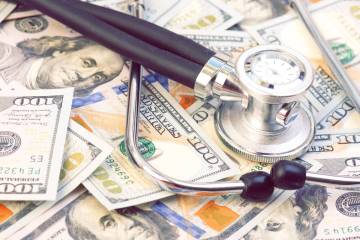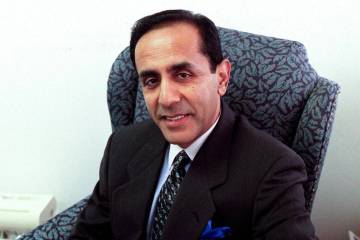Take action for a healthier heart
Keeping our heart healthy is something we all need to take to heart. During February's American Heart Month, awareness is raised about heart disease – and for a great reason – your heart is the center of your cardiovascular system. Your heart is vitally responsible for just about everything that gives your body life. Sadly, today, in our nation, heart disease remains the No. 1 killer of adult women and men. Once considered a man's disease, it is the No. 1 killer of women of every age.
One of the biggest contributors to these statistics is a lack of commitment to a heart-healthy lifestyle. Your lifestyle is not only your best defense against heart disease and stroke, it's also your responsibility. Making a difference starts with each of us committing to live a heart-healthy life. Please unite with the mission in preventing heart disease and make smart choices now for a healthy heart.
Dr. Nina's What You Need To Know About Cardiovascular Disease:
What is heart disease?
This is an umbrella term for diseases that affect our heart's blood vessels, electrical rhythm or structure. It can include heart attacks, chest pain, heart failure, arrhythmia, high blood pressure and more.
What is cardiovascular disease?
Abnormal conditions that affect the heart's blood vessels. Atherosclerosis is the primary culprit and describes plaque buildup inside our arteries (blood vessels that carry oxygen-rich blood). Similar to rust buildup within a pipe, the plaques can cause narrowing or blockage of heart vessels and prevent an adequate supply of oxygen to our ticker.
What are plaques comprised of?
They are clumps of cholesterol, fat, calcium and other substances. In fact the term atherosclerosis stems from the Greek word athere meaning "porridge," and sclerosis meaning "hardening."
What leads to atherosclerosis?
Too much low-density lipoprotein (LDL) cholesterol, smoking, high blood pressure or diabetes can result in damage to our blood vessels. When this occurs, LDL can enter the wall of the artery. And because our immune system sees the accumulation of LDL in the vessel wall as abnormal, immune cells follow and try to digest it, thereby adding to the size of the plaque.
What's wrong with a little clump of plaque?
It can prevent our hearts from receiving an adequate supply of oxygen. Plaques have one of the following fates:
- Stays the same size or grows slightly, but does not block blood flow or create symptoms.
- Grows large enough to decrease blood flow, causing the organ it feeds to become chronically oxygen deprived. Imagine if our busy heart does not get an adequate supply of oxygen. This can impair its ability to pump blood to the rest of our body. In some instances, we see symptoms occur when our heart's oxygen demand increases (e.g., exertion from going up a flight of stairs, lifting something heavy). Our heart is working harder and requires more oxygen, but atherosclerotic blockages preclude the increased oxygen supply. As a result, people with heart disease can experience chest pain on exertion, known as angina.
- Ruptures from the shearing stress of blood flow, or other injury, and causes complete blockage of the vessel. When a plaque ruptures, our immune system sees the exposed plaque contents as a foreign invader and sends swarms of cells to attack them. Additionally, to stop the bleeding, clotting cells that circulate in our blood start clumping on. Although both are noble causes, the body's response can lead to complete blockage of blood flow. Cell death, or infarction can occur within a matter of minutes.
I've heard the terms 'good' versus 'bad' cholesterol. How can cholesterol possibly be good?
High-density lipoprotein (HDL) is often referred to as "good" cholesterol because it helps remove LDL, or "bad," cholesterol from the arteries. This results in decreased plaque formation. Consequently, high levels of good cholesterol may be protective against heart disease, stroke and kidney injury due to atherosclerosis.
Atherosclerosis is something I will worry about down the road, right?
Wrong! Although symptoms typically present in our middle and late adulthood, the development of plaques often begins during childhood.
How can I stop (and possibly reverse) atherosclerosis?
- Decrease "bad" cholesterol levels. Consuming foods high in cholesterol can contribute to atherosclerosis. Fortunately, there are a number of delectable delights that can help lower LDL levels: oatmeal, nuts, beans and legumes, olive oil, and possibly red wine. In some instances, our doctor may determine that a cholesterol-lowering medication is appropriate.
- Maintain normal blood pressure. Hypertension or high blood pressure can damage our blood vessels. Staying physically active and lowering salt intake and stress can help prevent hypertension. And if we are diagnosed with hypertension, there are a number of medications that can help manage it. They work best when lifestyle changes are also implemented.
- Control diabetes. Chronically elevated blood glucose levels can damage our blood vessels. If you have diabetes it is imperative to keep our blood sugars under proper control.
- Avoid (or stop) smoking. The chemicals in cigarettes cause damage to our artery walls (not to mention, increase our risk for lung cancer and a number of other diseases). Smoking remains the number one preventable cause of death.
- Become physically active. Physical activity decreases LDL levels, weight, and our risk for diabetes and hypertension. At the same time, it increases HDL levels and nitric oxide production. Nitric oxide dilates blood vessels and can help with circulation.
Today, more than 1 in 3 adults has some form of cardiovascular disease. And studies estimate that 80% of heart disease can be prevented by lifestyle changes. We have the ability and can make choices that allow us to live longer, healthier lives.
Now is the time to take action for a healthier heart and give yourself a much better chance of enjoying a longer, healthier life. Regardless of age, there are things we can do today to prevent, slow down, or reverse heart disease. Research shows that even small changes to your habits can have a surprising effect on your health. Making heart-healthy changes can add many years to your life. That's a beat we can all march to!!
This article is for general information only and should not be used for the diagnosis or treatment of medical conditions and cannot substitute for the advice from your medical professional. Dr. Nina has used all reasonable care in compiling the current information but it may not apply to you and your symptoms. Always consult your doctor or other health care professional for diagnosis and treatment of medical conditions or questions.




























